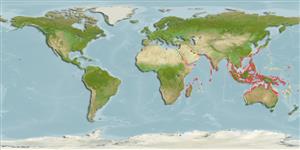Environment: milieu / climate zone / depth range / distribution range
Ecologia
marinhas; Água doce; estuarina associadas(os) a recifes; intervalo de profundidade ? - 10 m (Ref. 86942). Tropical; 36°N - 35°S, 20°E - 168°E
Indo-West Pacific: East Africa, Madagascar, Seychelles, Red Sea, Arabian Peninsula, Persian Gulf to India and Andaman Islands; and southeast Asia. Reaches south to the Arafura Sea (Ref. 9819) and northern Australia (Ref. 3131).
Tamanho / Peso / Idade
Maturity: Lm ? range ? - ? cm
Max length : 30.0 cm SL macho/indeterminado; (Ref. 4327)
Espinhos dorsais (total): 11 - 12; Raios dorsais (total): 9-11; Espinhos anais 3; Raios anais : 7 - 9. Body oval, compressed, robust. Lower opercular spine extending well beyond the opercular flap. Post-temporal bone exposed posteriorly and serrate. Color is dusky green above, white below; body, head and fins with an iridescent sheen. Four longitudinal brown stripes extend on the upper side from the head. A large prominent black blotch is on the distal end of the spinous portion of the dorsal fin. Similar brown stripes run across the caudal fin. (from Ref. 3131).
Adults inhabit coastal waters (Ref. 5213). Often found in brackish waters (Ref. 4833). Juveniles with floating weeds, often far offshore (Ref. 48635). Eggs are guarded and fanned by the male parent (Ref. 205). Marketed fresh (Ref. 5284).
Ciclo de vida ou comportamento de acasalamento
Maturidade | Reprodução | Desova | Ovos | Fecundidade | Larvas
Eggs are guarded and fanned by the male parent (Ref. 205).
Paxton, J.R., D.F. Hoese, G.R. Allen and J.E. Hanley, 1989. Pisces. Petromyzontidae to Carangidae. Zoological Catalogue of Australia, Vol. 7. Australian Government Publishing Service, Canberra, 665 p. (Ref. 7300)
Status na Lista Vermelha da UICN (Ref. 130435)
Ameaça para os humanos
Harmless
Uso pelos humanos
Pescarias: pouco comercial
Ferramentas
Relatórios especiais
Baixar XML
Fontes da internet
Estimates based on models
Preferred temperature (Ref.
123201): 24.9 - 29.3, mean 28.5 °C (based on 3179 cells).
Índice de diversidade filogenética (Ref.
82804): PD
50 = 0.6250 [Uniqueness, from 0.5 = low to 2.0 = high].
Bayesian length-weight: a=0.01122 (0.00683 - 0.01843), b=3.04 (2.90 - 3.18), in cm total length, based on LWR estimates for this species & (Sub)family-body (Ref.
93245).
Nível Trófico (Ref.
69278): 3.5 ±0.47 se; based on food items.
Generation time: 1.8 ( na - na) years. Estimated as median ln(3)/K based on 2
growth studies.
Resiliência (Ref.
120179): Elevada, tempo mínimo de duplicação da população menor que 15 meses (K=0.6-0.8).
Fishing Vulnerability (Ref.
59153): Low vulnerability (24 of 100).
Nutrients (Ref.
124155): Calcium = 67 [41, 112] mg/100g; Iron = 0.668 [0.427, 1.005] mg/100g; Protein = 19.6 [18.6, 20.5] %; Omega3 = 0.14 [0.09, 0.21] g/100g; Selenium = 22 [13, 39] μg/100g; VitaminA = 71 [25, 205] μg/100g; Zinc = 1.54 [1.12, 2.09] mg/100g (wet weight);
